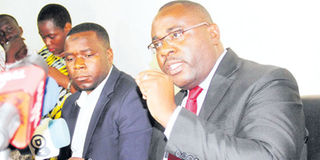Dismay after govt slaps two-year ban on ‘Mwanahalisi’

Tanzania Information Services (Maelezo) director and chief government spokesperson Hassan Abbasi addresses a news conference in Dar es Salaam yesterday. With him is Maelezo deputy director in charge of registration Patrick Kipangula. PHOTO | MAELEZO
What you need to know:
- Speaking to The Citizen in separate phone interviews shortly after the director of Information Services, Dr Hassan Abbasi, announced the decision, media stakeholders termed it as unfair and a threat to freedom of the press.
Dar es Salaam. Government decision to ban Mwanahalisi weekly newspaper has been greeted with an uproar by media stakeholders and rights activists.
Speaking to The Citizen in separate phone interviews shortly after the director of Information Services, Dr Hassan Abbasi, announced the decision, media stakeholders termed it as unfair and a threat to freedom of the press.
Yesterday, Dr Abbasi announced the decision to ban publication of Mwanahalisi for two years after it published on Monday an article with the headline: “Tumuombee nani, Magufuli au Tundu Lissu?” (Kiswahili for ‘Whom should we pray for, Magufuli or Tundu Lissu?’)
According to him, in the content of the article, the writer insulted President John Magufuli. Reacting, Mwanahalisi editor Jabir Idrissa said the government’s decision was unfair.
Mr Idrissa argued that if the writer of the said article had insulted the President, then the right place to take the matter would have been the courtroom, where it would have been settled.
“By announcing this decision, this the government has acted as the complainant, the prosecutor and the judge and this is unfair. The government should let the judiciary do its job,” argued further Mr Idrissa.
The editor added that he would advise the owners of the newspaper to seek justice in court.
TEF chairman Theophil Makunga said they were organising a meeting that would bring together media stakeholders to deliberate on the way forward following the government decision.
“We’ve been deeply disappointed by the government decision. We will convene a meeting to deliberate the way forward and we’ll inform the publif about our next move,” said Mr Makunga.
For his part, Tanzania Human Rights Defenders Coalition (THRDC) national coordinator Onesmo Olengurumwa said although he was disappointed but he wasn’t surprised by the decision.
“This vindicates media stakeholders’ fear that the government enacted the Media Services Act to control the media. The law gives the government ernomous powers,” said Mr Olengurumwa.
Media Institute of Southern Africa, Tanzania Chapter (Misa-TAN) chairperson Salome Kitomari reiterated calls for amendment of the Media Services Act so that bad sections that muzzle press freedom would be removed.
“The Act should serve to create a friendly environment for all stakeholders to operate smoothly. Banning a newspaper has far more negative consequences than simply blocking a voice,” she said.
Announcing the decision, Dr Abbasi claimed that on several occasions Mwanahalisi has been publishing seditious content contrary to media ethics.
According to him the government issued several warnings to the owners and the management of the newspaper but there was no change of behaviour.
Dr Abbasi said on January 30, this year the paper published a story with the headline: “Ufisadi katika ofisi ya JPM” (Kiswahili for ‘Corruption scandal in JPM’s office’).
However, Dr Abbasi claimed that the content of the story was about a corruption issue in an education organisation in Kibaha.
He added that in April, the same paper wrote a story with the headline “Maisha ya Mwakyembe hatarini,” (Kiswahili for: ‘Mwakyembe’s life in danger’). The content of the story, which was about Information minister Dr Harrison Mwakyembe, according to Dr Abbasi, wasn’t true.
This is the second time the government is imposing a ban on Mwanahalisi.
In June 2016, the High Court lifted the ban imposed on Mwanahalisi by the government in 2012 for publishing content, which was claimed to be a threat to the country’s security.
Mwanahalisi becomes the second paper to be banned by the government in this year.
In June, this year, it banned Mawio newspaper, a weekly tabloid, from publication for 24 months after it linked former presidents Benjamin Mkapa and Jakaya Kikwete to the mineral concentrates saga.
Dr Harrison Mwakyembe imposed the ban which was communicated in a statement released to the media by the Director of Information services, Dr Abbasi, who said the ban was to start immediately.
In one of its editions, Mawio carried photographs of the former presidents on its front page with a story detailing the two leaders’ role in the problems bedeviling the mining sector in Tanzania.
Apart from printing, the newspaper was also then not allowed to run its online version or on any of its social platforms.




